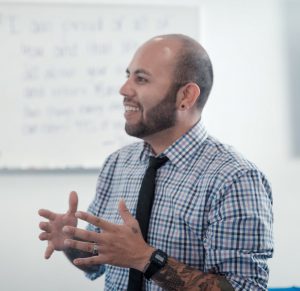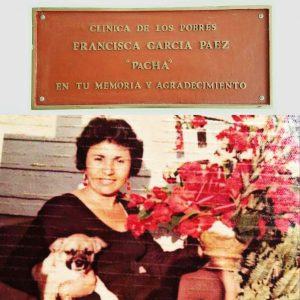Francisco Carbajal: Giving Youth a Voice

Francisco Carbajal provides San Diego’s troubled youth an alternative to entering the criminal justice system through a restorative justice program.
As the program manager and facilitator with the National Conflict and Resolution Center, Carbajal works to disrupt the trend of minority students becoming incarcerated due to school and municipal punishment policies, also referred to as the pipeline to prison.
“What I do it’s beautiful, it’s challenging, yet rewarding,” Carbajal said.
The program, Restorative Community Conference, is facilitated by the NCRC, an organization that provides resources to organizations, communities and individuals to solve conflict.
As opposed to a juvenile entering the criminal justice system, the restorative justice program provides an alternative to suspensions or expulsions by allowing the individual to take responsibility of their actions.
The program involves having the person who committed the crime or “responsible youth” to speak with the person harmed, community members, and anyone else involved in a circle giving everyone a voice.
It also includes a process of understanding the living situation and history of the responsible youth to understand their actions.
Through restorative justice, once an individual goes through the program all charges are dropped.
According to Carbajal, the program is close to being one of the most successful restorative justice programs nationwide, something that he attributes to the partnership with different key players like the District Attorney’s Office, law enforcement agencies and the community.
Carbajal began his work with the restorative justice program while completing an internship with the NCRC as a student at San Diego State University.
He was assigned to help create the restorative justice program, which was introduced by City Heights activists who wanted an alternative for their children, and after graduating he became a co-facilitator, then a full-time facilitator and eventually became the program manager.
Carbajal said he was originally assigned to help create the program because those in the organization felt he had “community in him.”
Which he did.
Originally for Tijuana, Carbajal was born into a family of dedicated individuals who sacrificed their time to help the community around them.
His grandmother saw a need for health education in her community, therefore, she dedicated her time to find resources on both sides of the border and also helped open a clinic.
Following her passing, Carbajal’s single mother took over her responsibilities and continued the family tradition of helping those around them.
“She had to take care of us, with help from my aunt, she had to take care of what my grandma would take care of normally, which is her siblings, now everybody kind of depended on my mom,” Carbajal said.
Watching his mother help her community was an eye opener, according to Carbajal, especially when El Niño destroyed several homes and she showed up to help those that were displaced.
Carbajal and his family moved to San Diego and settled in Rancho Penasquitos where he felt he did not fit in and discovered a subculture that allowed him to have a voice and feel a sense of belonging.
“I discovered my subculture, my subculture that to this day I love dear heartedly and without it I would not be where I am right now and that’s the subculture of punk rock,” Carbajal said.
After graduating from high school, Carbajal decided to follow a different path than what was being ask of him from school and traveled all over the United States and Europe playing music and diving into a community that make him feel welcome.
“It was people from all different walks of life in the culture of punk rock. I felt so welcomed to that,” Carbajal said.
He then decided to return to San Diego to continue his education and followed a path that allowed him to give youth their voice back similar to when he discovered his own voice.
Carbajal said that although the work he does feels rewarding, there is still more to be done, however, without his experiences he would not be able to do what he does.
“It makes me feel that I’m making a difference literally dismissing cases of youth, usually that is done by lawyers, done by public defenders not by community punk rock dude from San Diego and Tijuana,” Carbajal said.






